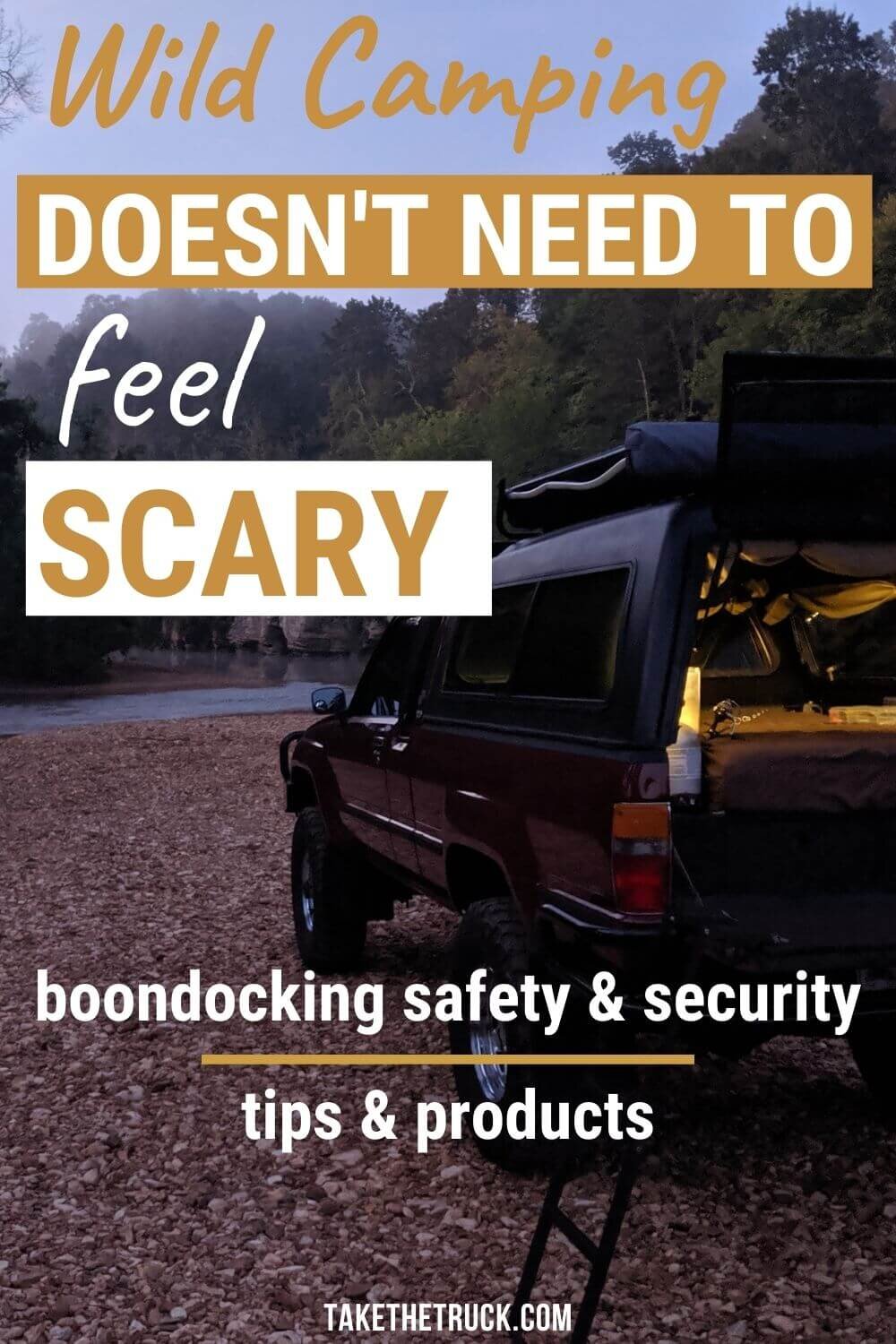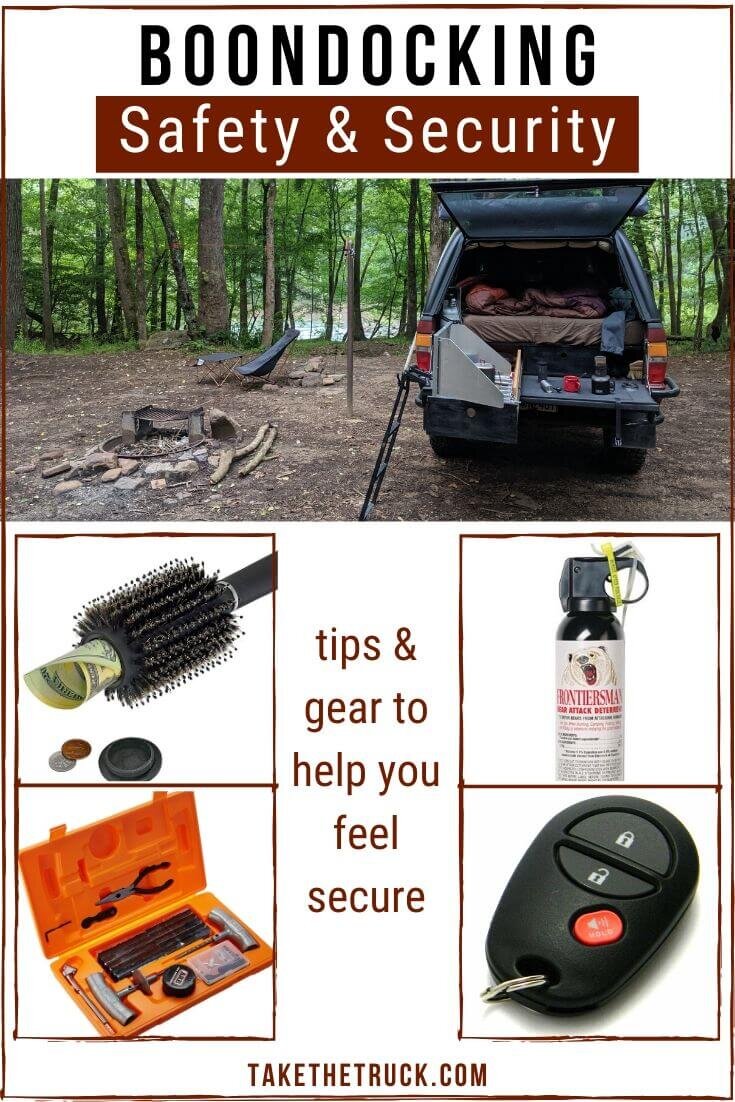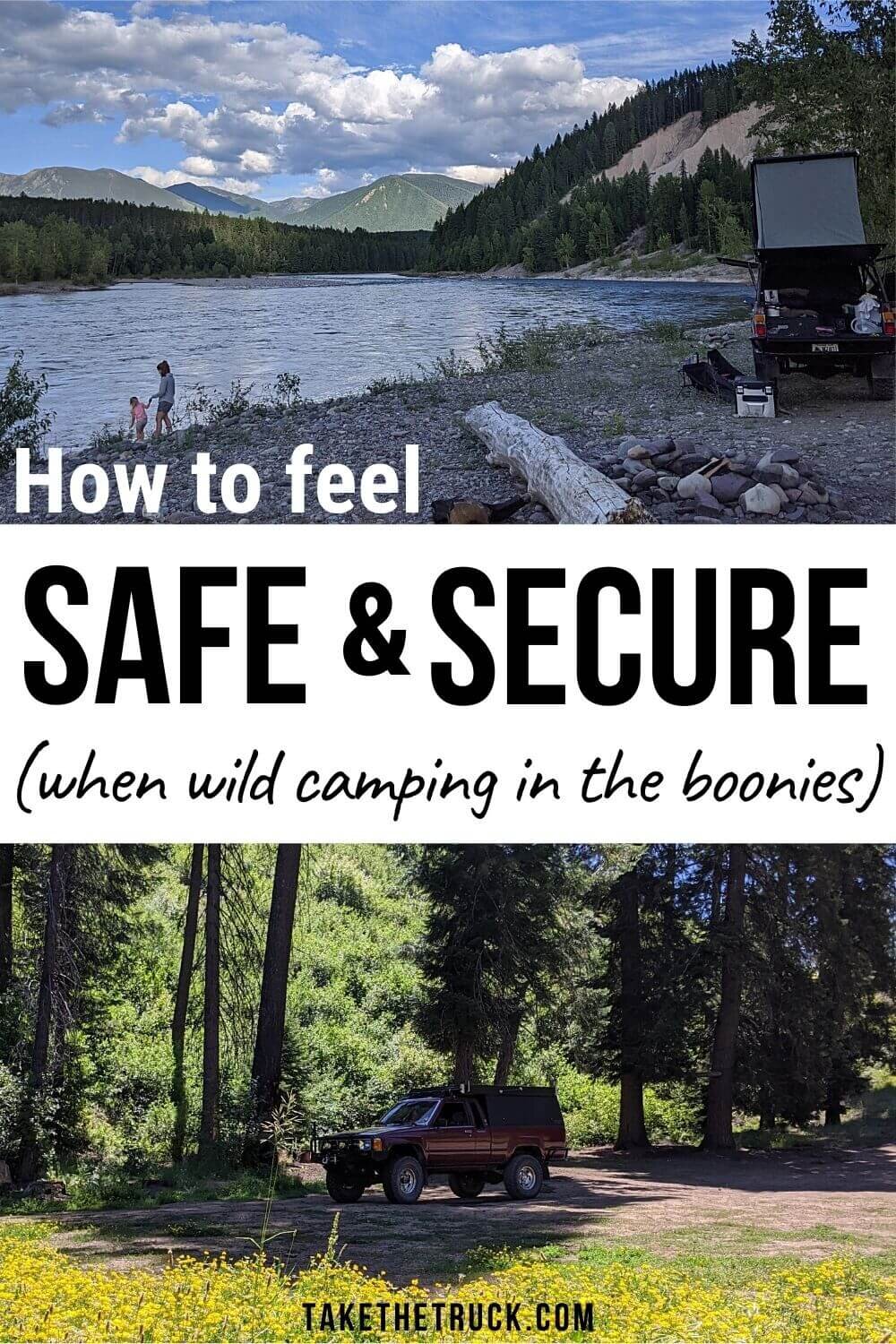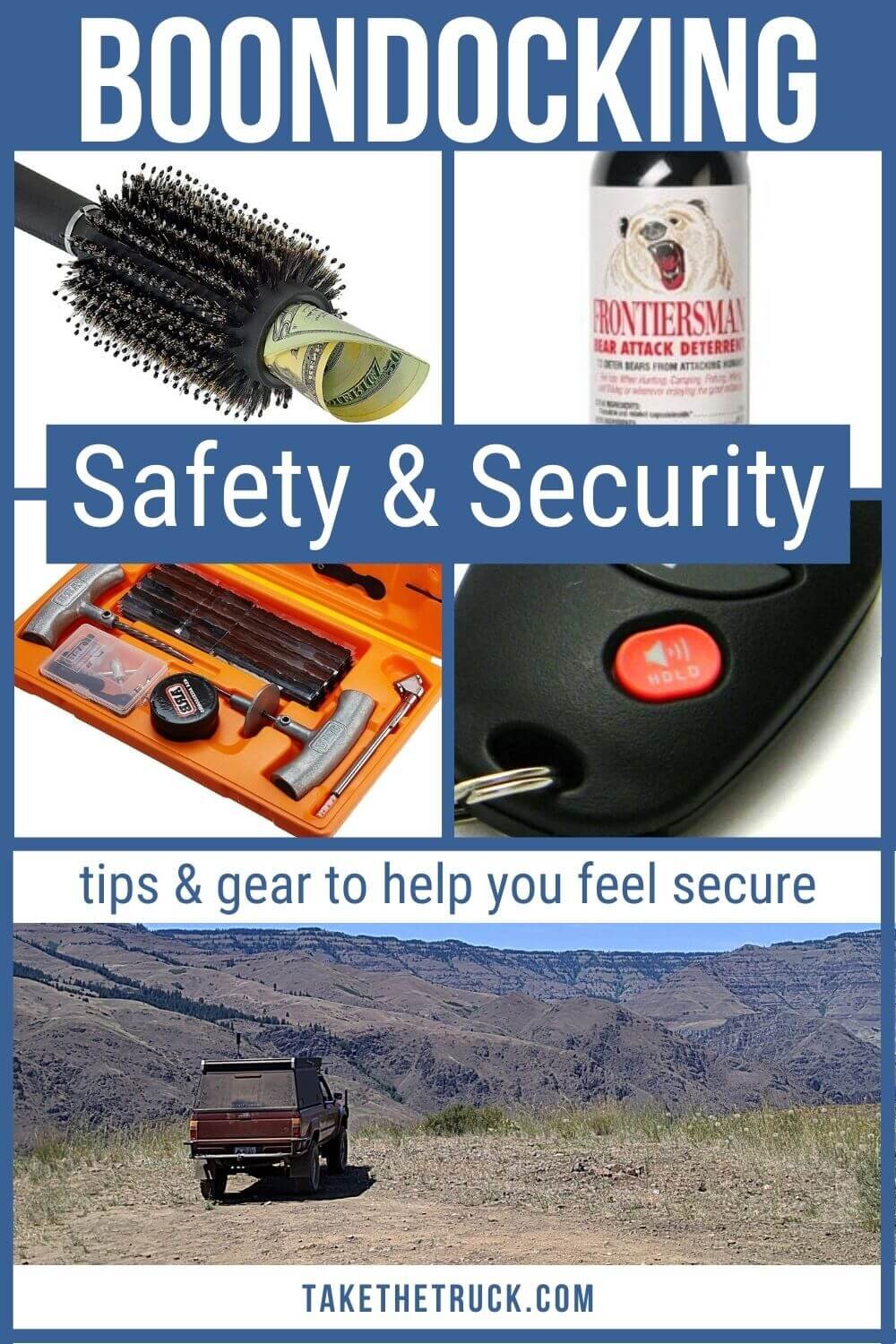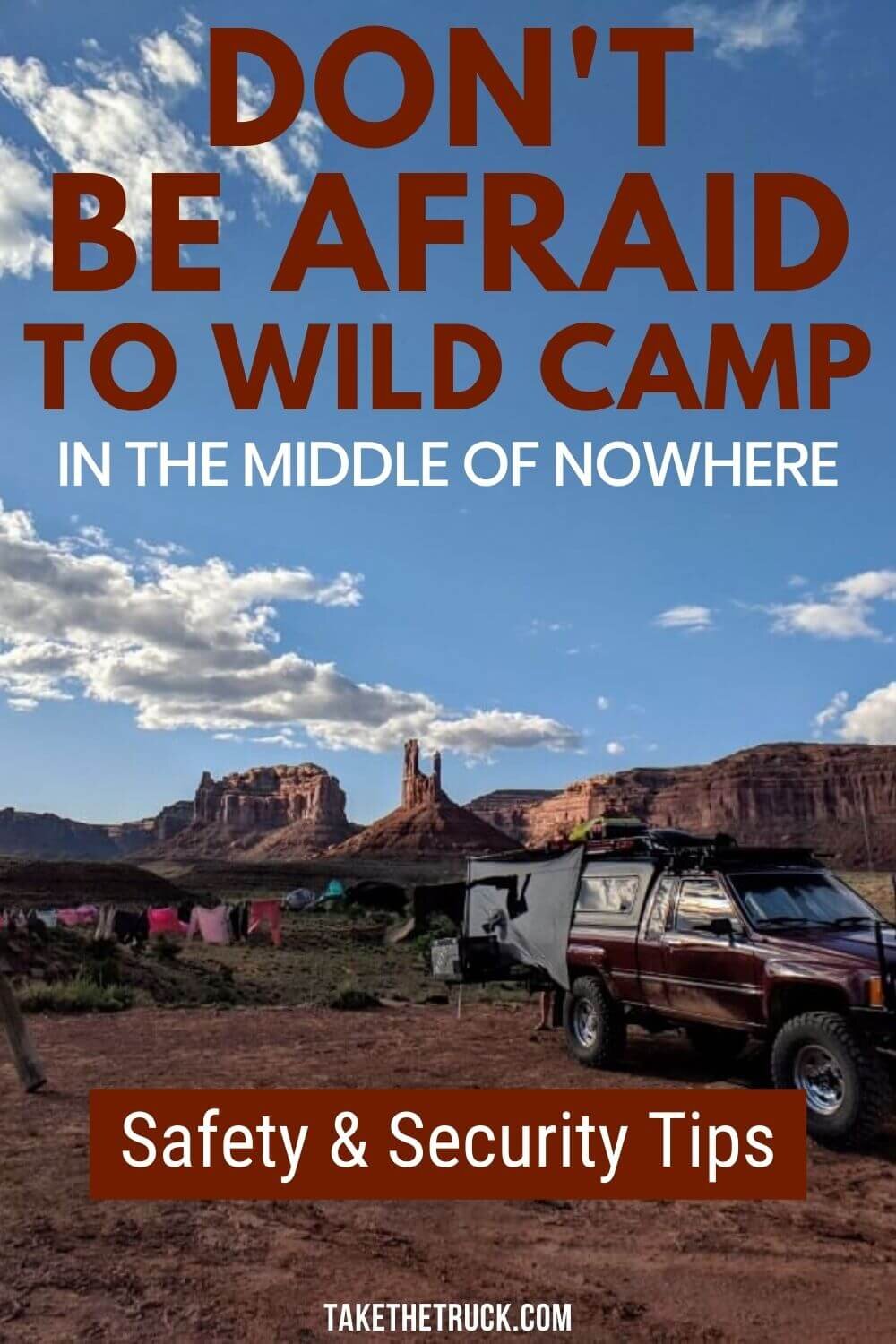Wild Camping Safety And Security
If you’re considering wild camping or dispersed camping for the first time - without access to running water, electricity, or cell service - something that may be weighing on your mind is camping safety.
As with most new experiences, while sometimes scary at first, the more you go wild camping the more confident you become and the more safe you feel.
This post will provide you with all the camping safety knowledge you’ll need to feel more confident in wild camping or dispersed camping on your next adventure!
*(This post contains affiliate links. This means we may receive a small commission, at no additional cost to you, if you make a purchase through a link. See our full disclosure.)
Camping Safety - Encountering Strangers
Let’s start with the big one - how to feel safe and secure as far as encountering other people when primitive camping in remote areas.
Statistics show that most crimes occur in areas of higher population density. However unfortunate this is, it means that if you are somewhere where there are fewer people, there is less crime.
So stop watching “Criminal Minds,” and let’s talk about a few basic measures you can take to feel secure and stay safe in the unlikely event of a human confrontation when wild camping.
If you’re camping alone, leave a second chair and a pair of men’s boots or something outside to make it apparent that you’re not camping alone (especially if you are)
If your vehicle has a remote alarm, sleep with your keys nearby to activate the car alarm if needed
Alternatively, travel with an air horn* to both startle any intruders and alert other campers if needed
Carry a can of bear spray* and know how to safely use it - this is a great non-lethal form of self-defense to carry with you while camping
Keep a super bright self-defense flashlight* on hand, and the strobe feature is great for signaling if needed
Don’t completely set up camp if you’re feeling uneasy (leave the awning in, chairs in, etc) so you can drive away quickly and easily
You have wheels so use common sense and drive away if you’re uncomfortable with a specific site
We always recommend that when wild camping with children, ensure that your tent or vehicle is large enough to sleep the entire family together (no separate princess and fire truck tents, people!). If you must sleep separately, ensure at least one parent is paired with each child.
Speak with a local ranger or game officer and make yourself aware of local hunting seasons before selecting a site. If you do select a site in areas where hunting is permitted, wear brightly colored orange vests and hats while there.
Carrying a taser or firearm - this is very much a personal choice as well as a highly contentious topic. You absolutely must know the laws and regulations for carrying any self-defense weapons as they differ from state-to-state and region-to-region. You also must be adequately trained, licensed, and confident in the use of any self-defense weapon.
Camping Safety - Security & Theft
Most instances of theft are crimes of opportunity - simple smash & grab jobs where someone sees something they want or something of value in plain sight, and they break a window or simply walk off with it.
Here are some simple practices and deterrents to help keep your camping area safe and secure, while deterring people with questionable morals:
Carry your valuables with you - this is an obvious one but worth mentioning - things like your wallet, keys, jewelry, important documents, etc are generally small and easy to carry with you if you leave camp. Consider keeping them together in one grab-bag that’s easy to just throw in your pack.
Be friendly with camping neighbors (if you have any), because it’ll make them more aware if strangers are at your camp when you’re not around
Tuck your camping gear away when you leave camp - if it’s out-of-sight, it won’t tempt anyone. And use a cable lock* to secure anything that can’t be put away
Consider leaving music playing in your tent, vehicle, or camper if your leaving camp
Bring along your dog, or have a ‘dog inside’ sticker on your rig
Use a wheel clamp* and/or a tow trailer hitch lock* if you’re using a camper and leaving it at camp for a day trip
Carry a diversion safe - like one of these faux soda cans* in your camping fridge or cooler to keep any valuables safe while at camp
Camping Safety - AvoidING Emergencies
In reality, when wild camping or dispersed camping, you are far more likely to find yourself in a vulnerable, precarious, or unsafe situation as a result of improper planning and forethought, rather than because of a malicious person.
So let's discuss some of the ways you can minimize your own camping safety and security risks before you set out on your camping trip.
Always begin by packing with a list and check it twice so you don’t forget anything vital
Be aware of flood zones when establishing camp, and don’t travel through them during heavy rain. The average vehicle can be displaced by only 2ft (or less) of flowing water.
Try to arrive at any new wild camping area during daylight so you can make yourself aware of any potential dangers or obstacles more easily
Fill up your gas tank before heading too far off the beaten path, especially if you don’t really know where your final destination is! If you find yourself dispersed camping frequently, having an extra gas tank* might bring peace of mind.
Scout any new or questionable roads in advance if you’re traveling in a larger vehicle or with a camper so you don’t get into a situation you cannot turnaround or back out of
If you can’t scout ahead, call a local ranger station or read any comments there are about access to the site on freecampsites.net (or similar online free camping resource) to determine if the site you’re considering is feasible in your vehicle
If you’re sleeping in a camper, car, truck, SUV, or other vehicle, install a carbon monoxide detector*, and always keep a quality ABC fire extinguisher* on hand
Carry duct tape and eternabond tape* - it’s incredibly handy for making small repairs, fixing minor leaks, making splints, and any number of things that may come up while wild camping or dispersed camping
Camping Safety - Be Prepared in the Event of an Emergency
Sometimes, sh*t happens. No matter what camping safety or security measures you take in advance, you might still end up in a pickle. And if that’s case, it’s best to be prepared.
Oftentimes when wild camping or dispersed camping off-grid there is no cell service, so plan accordingly, and consider buying a cell booster to improve your chances of a signal in the event of an emergency while camping
Let people know where you are going, how long you’ll be gone, and have them check in with you
Carry an alternate communications device:
HAM radios or GMRS radios are excellent, but note that you’ll need a license to operate these devices
OR consider investing in a GPS tracker/messenger like the Spot Messenger* or Garmin InReach*. These devices can let loved ones and emergency services see your location and allow you to send SMS messages regardless of cell service for a monthly fee
Check our our in-depth guide to Overlanding Off Road Radios and Emergency Communication Devices for more info and options
Have a quality first aid kit*, know where it is, know how to use it, and always restock it once your home
Be familiar with the direction of the nearest hospital whenever you’re headed to camp so that - in the event of an emergency - you can start driving until cell service or other emergency communication can be made
Know your GPS location or description of where you are camping in the event you need to relay this information to a first-responder
Carry an emergency automotive roadside kit* and tools
Keep a portable air compressor* and tire repair kit*, or at least a can of fix a flat* (and know how to use them)
Have a plan in the event of a vehicle breakdown, and consider a membership to a roadside service such as AAA or GoodSam Roadside Assistance
If your vehicle and space allow, you may consider carrying a traction board like Maxtrax*, and a shovel to dig yourself out of trouble in sandy or muddy situations.
Camping Safety - Animals And Wildlife
Animals are rarely a serious safety threat if you remember that you are in their environment and take some basic precautions to protect both yourself and the animals while camping in the wild.
Don’t leave food and trash around at night that will attract animals, and definitely don’t feed wildlife. If you’re camping in bear country, familiarize yourself with best-practices.
Hike with bear spray and make noise to alert any wildlife of your presence. Note that bear encounters are actually more likely in developed campgrounds where they learn to get a consistent supply of food.
Avoid mosquito bites - we recommend using a picaridin based spray like this*, instead of the traditional deet based repellents, or look into these sprayless repellent devices* if you want to avoid bug sprays altogether. We also recommend treating clothing and fabric with a Permethrin spray* each season to help with mosquitos and ticks.
Check for ticks regularly and remove them immediately if found
Keep your dogs close to camp so they don’t disturb or have a negative encounter with any of the more nefarious wildlife
Camping Safety - Hazardous Weather And Dealing With The Elements
Make plans to keep yourself protected from the elements when wild camping or dispersed camping, especially if you’ll be camped in an unfamiliar climate or region where the weather may behave differently than you’re used to.
Sun Protection - at higher elevations and arid climates the temperature feels cooler because there’s less humidity, but the sun still poses a serious risk. So it’s important to always wear sunscreen, hats, long sleeve shirts, sunglasses, or hang out in the shade, as you might not realize you’re getting burned.
Know the camping area’s fire danger levels and regulations so nothing gets out of control, as well as any fire weather advisories
Temperature Range - be prepared with appropriate clothing layers and sleepwear. The temperature range you might be accustomed to at home varies wildly throughout the country and world! Check out these posts for more info and help:
Pack a quality folding saw* (here’s exactly why we recommend this folding camping saw) to cut firewood if it will be cold and it is permitted, and carry an emergency blanket* just in case
Keep your pet’s safety in mind as well while camping - ensure they have adequate protection from the elements, namely extreme heat and cold. Campers heat up just as quickly as cars do in direct sunlight!
Camping Safety - Safe Food and Drinking Water
Food poisoning and waterborne illnesses and parasites, like giardia, are no bueno. So take precautions.
Food safety at camp - wash hands, cook meat to the correct internal temperature, and ensure that cold or frozen foods are chilled appropriately so they don’t spoil or become unsanitary!
Drinking water safety at camp - the average person requires 3 liters of drinking water per day. Bring enough (tanks and containers should be full) and have a dependable water filtration system* as a backup.
Don’t forget to have enough of both for your pets too!
Public Safety while Camping
In all the worrying about your own camping safety, don’t forget to think about public safety while camping as well!
Campfire Safety - know local restrictions, burn bans, or special weather circumstances and don’t take unnecessary risks
Don’t bring firewood in from elsewhere to prevent the spread of invasive species or disease
Remember that fires can behave differently depending on the environment
Spread out coals and drown campfires thoroughly with water or mix with sand and dirt until they’re cool to the touch prior to leaving your site
If you’re using a camper with facilities, ensure you arrive with empty grey and black water storage tanks
Know how to properly dispose of human waste while dispersed camping - we have this entire guide to help you learn how!
Don’t feed the wildlife or leave food out for them to find as this can lead to them becoming nuisances and/or dangerous to other campers in the future. Which may result in the animal having to be relocated or eliminated by wildlife management personnel.
Follow the 7 Leave No Trace Principles and if you pack it in, pack it out - pets included
Whew! That’s a lot of camping safety info to digest! But keep in mind that in all of our years of camping, we’ve never had an issue with camping safety or security while wild camping or dispersed camping (but we’re also always prepared).
Our hope is that, armed with the tips from this post, you’ll feel a little more confident to try a wild camping or dispersed camping trip of your own!
In the meantime, we’d love for you to SUBSCRIBE to our future blog updates!
Related Posts:
Portable Camping Power Part 3: Selecting a Camping Power Supply
Why We Love This Camping Washing Machine [Scrubba Wash Bag Review]
Pin Me!
We’d appreciate a share! Thanks!


